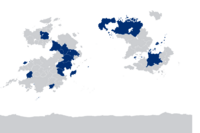Portal:Kylaris/Features: Difference between revisions
No edit summary |
No edit summary |
||
| Line 1: | Line 1: | ||
<div style="float:left;margin:0.5em 0.9em 0.4em 0;">{{Region icon Kylaris}} | <div style="float:left;margin:0.5em 0.9em 0.4em 0;">{{Region icon Kylaris}} | ||
[[ | [[File:GaullicanEmpireMap.png|200px]] | ||
</div> ''' | </div> A '''superpower''' is used to describe a [[List of sovereign states and dependent territories (Kylaris)|state]] that has the ability to extensively project both {{Wp|hard power|hard}} and {{wp|soft power|soft}} {{wp|power (international relations)|international relations}} [[Kylaris|globally]]. Superpowers are distinguished from {{Wp|great power}}s in that they are able to marshal economic, diplomatic military, technological and cultural strength in a dominant manner making them "above" the great powers in their power. | ||
The term was first coined in a 1920 essay by the [[Estmere|Estmerish]] scholar Arthur P. Randolph to describe the [[Gaullican Empire]]. Following the defeat of [[Gaullica]] in the [[Great War (Kylaris)|Great War]] scholars have struggled to come to a consensus on whether certain nations or organisations can be termed as a superpower, although many agree that the post-war order has generally been {{wp|Polarity (international relations)|multipolar}}. Since the 1990's there has been renewed interest in the term as several states or international organisations - most prominently the [[Euclean Community]], [[Xiaodong]] and [[Senria]] - have been predicted to or have become superpowers in their own right. | |||
The term has been more commonly used to describe nations in {{Wp|regional power|regional}} contexts. ('''[[Euclea|See more...]]''') | |||
<div style="text-align:right>[[File:KylarisRecognitionAchievement.png|25px]] '''{{cl|Kylaris Articles of Recognition|See all articles of recognition}}'''</div> | <div style="text-align:right>[[File:KylarisRecognitionAchievement.png|25px]] '''{{cl|Kylaris Articles of Recognition|See all articles of recognition}}'''</div> | ||
Revision as of 00:36, 1 November 2020
A superpower is used to describe a state that has the ability to extensively project both hard and soft international relations globally. Superpowers are distinguished from great powers in that they are able to marshal economic, diplomatic military, technological and cultural strength in a dominant manner making them "above" the great powers in their power.
The term was first coined in a 1920 essay by the Estmerish scholar Arthur P. Randolph to describe the Gaullican Empire. Following the defeat of Gaullica in the Great War scholars have struggled to come to a consensus on whether certain nations or organisations can be termed as a superpower, although many agree that the post-war order has generally been multipolar. Since the 1990's there has been renewed interest in the term as several states or international organisations - most prominently the Euclean Community, Xiaodong and Senria - have been predicted to or have become superpowers in their own right.
The term has been more commonly used to describe nations in regional contexts. (See more...)
